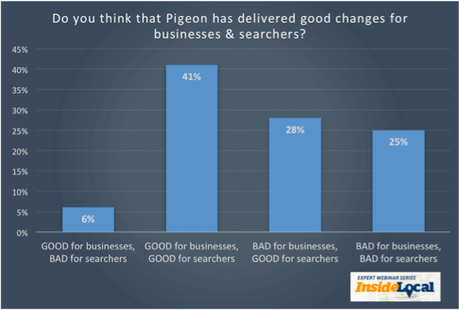 When Google released a new algorithm back in July of last year, much heated debate was generated among the SEO and SEM communities about the likely impact of the changes on local search results. The unnamed update, dubbed “Pigeon” by the team at Search Engine Land, was aimed at tying local search results more closely to traditional rankings and improving geo-targeting in Google Maps and Google Web search results.
When Google released a new algorithm back in July of last year, much heated debate was generated among the SEO and SEM communities about the likely impact of the changes on local search results. The unnamed update, dubbed “Pigeon” by the team at Search Engine Land, was aimed at tying local search results more closely to traditional rankings and improving geo-targeting in Google Maps and Google Web search results.
A quick look at the comments on Search Engine Land’s post that broke the news shows that reaction to the change was swift and very mixed. Some were seeing an immediate improvement, many others complained that they had all but disappeared from search results and wiser heads counseled to wait and see how things panned out.
So with a few months under our collective belts and with the dust now settling, what has the reality been for those who are out there working in the SEO field? In an attempt to answer that question, the team at Bright Local polled attendees at a late November webinar, the topic of which was ”The Impact of Pigeon.” The results, as revealed by Bright Local Founder and CEO Myles Anderson at Search Engine Land suggest that (as usual), the wise heads were right, with no major shocks being reported. Here’s a summary of what they found:
- Respondents were split on whether the changes had been positive for businesses, with (53%) suggesting they had been bad. Interestingly, the majority (69%) felt that Pigeon had delivered positive changes for searchers. Better targeting, more focus on the user, better results more relevant to the user seems to be the consensus. Here’s an image that better explains this.

- More than half of the poll respondents (58%) said that they have, or will change their strategy due to Pigeon. A third of respondents said that they don’t plan to make any changes at this particular point in time.
- The vast majority of those who responded to the poll said that they had seen only small changes to traffic following the update. Just 9% said that they had lost a lot of traffic.
- An overwhelming majority (92%) said that they had seen little or no change to conversions from traffic post Pigeon.
The overall conclusion from the poll was that there had been neither any big winners or any big losers from the Pigeon update, although it is acknowledged that the impact will vary according to the specific sector and circumstances of a business.
While the poll itself might have been limited in scope (just a little over 400 participants), the webinar provided some interesting discussion by the expert panel on the issues surrounding Google and local search. Questions such as which ranking factors are more important, which types of business are most affected, and why there seems to be more spam following the update are addressed. These are the nuggets of information I was most interested in and maybe you will be, too. You can see the session in its entirety by following the link at the bottom of the post–it’s definitely worth your time to watch!
One of the most interesting topics of discussion was around the topic of Google and local search. The consensus from the panel was that results are likely to become more focused, with location and brand playing an increasingly important role in search rankings as Google further refines its algorithms. Most importantly, the message from the experts is that you shouldn’t freak out about local search or about Google results in general. Local is but one factor that search engines take into consideration. Overall, if your marketing strategy is multifaceted and is focused on delivering value in a variety of ways, building strong relationships and earning trust and demonstrating credibility, then you should be in good shape.
One point that was especially interesting to me was the geographical spread of Google’s updates. Rollouts of new updates such as Pigeon and the earlier “Carousel” feature only seem to be operating largely in the U.S. market. The panelists from the UK and Canada reported that they have seen little effect from either of these updates in search results.
Bottom line, no big surprises from the Pigeon update. As usual following any update, the SEO industry is focused on watching how this plays out, testing theories about the changes and how that impacts search and their SEO strategies. To my way of thinking, most effective strategy is an integrated approach that incorporates what you’re doing online with what you’re doing offline. And when it comes to what you’re doing online, make sure you’re focused on building your brand’s authority by providing value. This includes delivering a great user experience, doing everything with a mobile first mindset, creating and effectively distributing fresh, relevant content that serves the needs of your customers and prospects, and having a legitimate presence in the social media space.. If you’re doing that, Google’s updates, including this one, shouldn’t impact you in any manner but a positive one.
Over to you. Did you see any changes to your search rankings following the Pigeon update and have you made any changes to your SEO approach? If you operate outside of the U.S. do you see these changes in your search results? You know I’d love to hear your feedback on this one.
Other resources on this topic:
Webinar: The Impact of Pigeon
Pigeon SEO Update 2 Months Later: Google Flipped The Bird at Local Search
Experts Weigh In On Google’s “Pigeon” Update Aimed At Improving Local Search Results
58% of Local Marketers Will Change Tactics After Pigeon Update
photo credit: stewartbaird via photopin cc
SEO: What’s The Impact of Google’s Pigeon Update is a post from: V3 Kansas City Integrated Marketing and Social Media Agency

